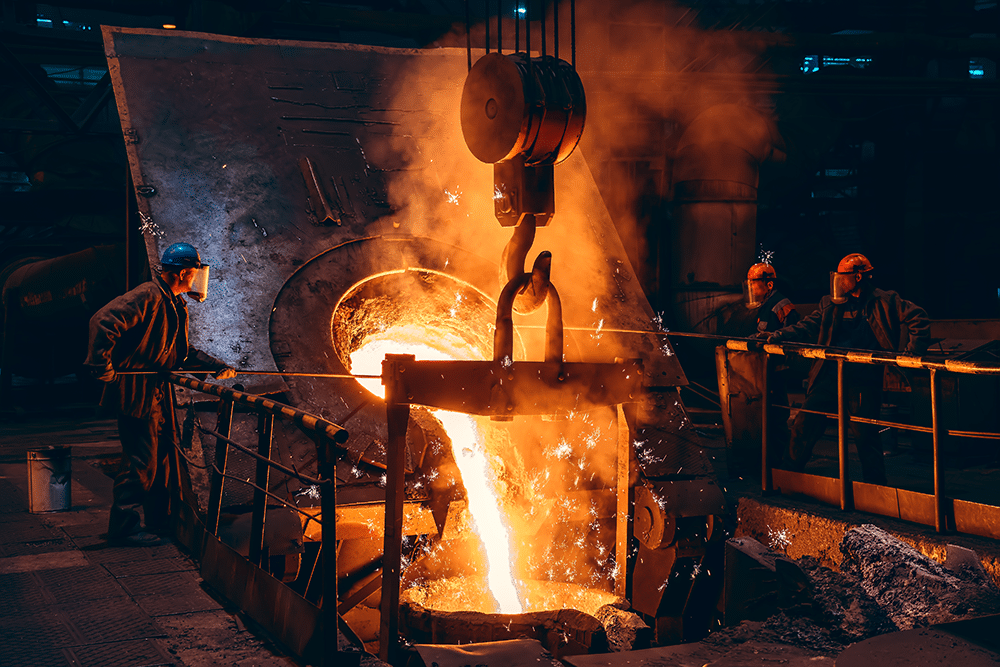Tata Steel formally announced its plans to permanently blow down the two blast furnaces at its Port Talbot works. Tata’s plan is to replace them with an electric arc furnace. Steel manufacturing analysts say the move will cut the facility’s listed crude capacity 40%.
The plant will blow down one blast furnace by mid-2024 and the second toward the year’s end. In a January 19 announcement, Tata said that they would shut down the site’s coking ovens and the two basic oxygen furnaces in the same time frame. However, the conglomeration noted that rolling on the site’s hot strip mill will continue.
“In addition, the downstream and steel processing centers will continue to serve customers by utilizing imported semi-finished steel from Tata Steel plants in the Netherlands and India, along with other select strategic suppliers,” Tata said.
One official within the company told MetalMiner that the EAF on the site will posses an annual crude capacity of 3 million metric tons. The source added that the EAF will primarily receive scrap as feed stock, but can also use some hot briquetted iron to also produce crude steel.
Cut metal expenses without compromising quality using the Monthly Metals Outlook. Start with a free sample report.
Major Changes for UK Steel Manufacturing
Port Talbot is one of the largest steel manufacturing hubs in the UK. In 2023, a Tata official told MetalMiner that the facility’s two blast furnaces produce about 4.8 million metric tons of pig iron annually. Meanwhile, its two basic oxygen furnaces hold an annual capacity of 5 million metric tons of crude steel. The site then casts the liquid metal into slab for rolling into hot and cold rolled coil.
The Mumbai-headquartered group announced in September that it reached a preliminary agreement with the UK government on funding for a £1.25 billion (almost $1.6 billion) program to de-carbonize Port Talbot. The project’s main goal strives to replace the blasts with electric arc technology. Tata will receive £500 million ($635 million) under that agreement, whilst the remainder would come from the group’s coffers.

Tata stated that the shutdown of the plant will likely affect 2,800 jobs, with the first 2,500 impacted in the next 18 months. “Tata Steel expects that a further 300 roles could be impacted over three years, which could include the potential consolidation and rationalization of cold rolling assets in Llanwern once the required investments are completed at Port Talbot,” the group added.
Both Workers’ Unions Expressed Frustration at the Move
In a January 19 joint announcement, both the Community and GMB trade unions condemned Tata’s plans, stating that they “do not accept Tata Steel’s rejection of the Multi-Union Plan and confirmation they intend to press forward with their original devastating proposals.”
Under the multi-union alternative plan proposed in November, BF No. 4 would continue operating until the end of its campaign in 2032. Meanwhile, Tata would build one smaller electric arc furnace and then either a second one or an Open Slag Bath Furnace. However, Tata noted in its announcement that the projected operating costs under such a configuration would be unaffordable.

The group added that building the electric arc furnace in an operating melt shop would also be risky, incur higher costs, and potentially cause delays to the planned 2027 start of the electric arc furnace. The trade unions also warned of further steps due to the planned blast furnace blow downs. “We will now consult our members on next steps and all options to protect jobs are on the table, including industrial action,” the joint announcement noted.
The plan to replace Port Talbot’s blast furnaces would tentatively mark the end of steel manufacturing via blast furnace production in the United Kingdom. In early November 2023, British Steel announced plans to replace its four blast furnaces with electric arc furnaces, stating that the newer technology could start operating as early as 2025.
Subscribe to MetalMiner’s free Monthly Metals Index report and gain actionable price insights to 10 different metal industries.




